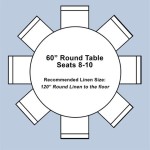Exploring the Benefits of Round Table Discussions
Round table discussions, a collaborative and interactive format where participants sit around a circular table, fostering equal participation and open dialogue, have become a cornerstone in various fields. From business strategy sessions to academic conferences, the round table format offers a unique and valuable approach to idea generation, problem-solving, and knowledge sharing. This article explores the key benefits of round table discussions, highlighting their significance in promoting effective communication, fostering innovation, and building consensus.
Enhanced Communication and Collaboration
Round table discussions create an environment conducive to open and engaging conversation. By arranging participants in a circle, the format eliminates the traditional hierarchical structure often found in meetings, promoting a sense of equality and encouraging everyone to contribute their ideas and perspectives. This equal footing fosters a more relaxed and informal atmosphere, where participants feel comfortable sharing their thoughts without fear of judgment or intimidation. The absence of a designated leader or head of the table encourages participants to actively listen to and engage with each other, resulting in more effective communication and a greater understanding of diverse viewpoints.
Stimulating Creativity and Innovation
The collaborative nature of round table discussions provides a fertile ground for the emergence of innovative ideas. By bringing together individuals from different backgrounds and expertise, a round table setting enables the cross-pollination of thoughts and perspectives. This diverse mix of experiences and viewpoints facilitates the development of novel solutions and approaches to challenges. The open forum encourages free-flowing brainstorming, where participants can build upon each other's ideas, leading to a more comprehensive and creative exploration of potential solutions.
Building Consensus and Shared Understanding
Round table discussions are particularly valuable for fostering consensus and shared understanding among participants. The circular seating arrangement encourages a more inclusive dialogue, allowing everyone to voice their opinions and concerns. The absence of a dominant figure or hierarchical structure promotes a more equitable exchange of ideas, where all voices are heard and considered. This shared understanding and collective ownership in the final outcome contribute to a more positive and productive outcome, ensuring that all participants feel heard and valued.
Fostering a Sense of Community and Belonging
Round table discussions create a more intimate and engaging experience than traditional linear meeting formats. The relaxed and informal setting fosters a sense of community and belonging among participants, encouraging them to connect with each other on a personal level. This sense of community fosters a more collaborative and supportive environment, promoting open communication and a willingness to share ideas and insights. This shared experience can lead to stronger relationships and a more cohesive team dynamic, enhancing collaboration and collective problem-solving.
In conclusion, round table discussions offer numerous advantages that make them a valuable tool for effective communication, creativity, and consensus-building. By eliminating hierarchical structures, promoting inclusivity, and fostering a sense of community, round table discussions provide a dynamic and engaging platform for idea generation, problem-solving, and knowledge sharing. This format is particularly relevant in today's world, where collaboration and open dialogue are essential for navigating complex challenges and achieving shared goals.

Exploring The Relational In Wellbeing

The Roundtable By Common And Enlocus Architectureau

Neutrophil Diversity And Function In Health Disease Signal Transduction Targeted Therapy

Autofit Tables In Word Microsoft Tips

The Emerging Hemp Industry A Review Of Industrial Materials And Manufacturing

Recent Advances In Health Benefits Of Bioactive Compounds From Food Wastes And By S Biochemical Aspects

Electrically Heated Fluidized Beds A Review Industrial Engineering Chemistry Research

Top Tips For Microsoft Word Table Manipulation Conversion Dictation

Local Solutions For Sustainable Food Systems The Contribution Of Orphan Crops And Wild Edible Species

Curbing Household Food Waste And Associated Climate Change Impacts In An Ageing Society Nature Communications
Related Posts








